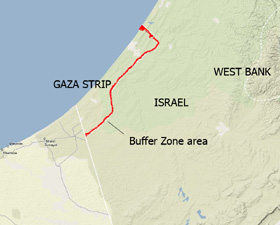ISRAEL-OPT: "Buffer zone" reducing Palestinian agricultural land in Gaza
IRIN
17 Giugno 2008
JERUSALEM/GAZA, 16 June 2008 (IRIN) - An expanding "buffer zone" between Israel and the Gaza Strip is driving Palestinians away from the Strip's border with Israel, reducing their access to fertile land, rights groups and agricultural associations in the enclave are warning.
The Israeli enforced "buffer zone" along the border with Gaza was originally supposed to stretch about 150 metres into Gaza, but organisations like the Palestinian Agricultural Relief Committees (PARC), a local non-governmental organisation (NGO), say this has now increased to over 1,000 metres in places, and is affecting thousands of farmers along the roughly 50km-long border with Israel.

"This is deeply affecting the economy in Gaza," Ahmed Sourani, of PARC in Gaza City, told IRIN, adding that "farming is an important part of food security here."
Most Gazans receive handouts from the UN and unemployment is rife. The blockade on the enclave is being maintained, with Israel limiting imports to basic humanitarian supplies and barring all exports, while travel is restricted to a few patients. The southern Rafah border with Egypt is also sealed for the most part.
The "buffer zone", in existence for over a decade, has been extended in recent years, Palestinians said.
Even before Israel's evacuation of its settlements and permanent military bases as part of the so-called "disengagement plan" in 2005, the first 500 metres, after the initial (barren) 150 metres, was limited to the growing of crops less than one metre high, which meant olive trees had to be cut down, aid workers in the enclave said.
Palestinians say the official "buffer zone" and the areas it has extended into recently, have become "no go zones", as farmers have been killed or injured if they got too close to the border, and others are now afraid to go anywhere near the area.
The Israeli military said it needs the "buffer zone" to make it more difficult for militants to fire rockets and mortars into the Jewish state and set off explosives near the border fence. Some recent attacks on border crossings have led to the killing and wounding of several Israelis.
"What determines our actions are the threats. It's not right to place the blame on Israel; the [Palestinian] farmers should blame the militants and the terror organisations," said Maj Avital Leibvich, an Israeli military spokeswoman.
Sniper fire at Israeli soldiers and civilians, threats of infiltration into the Jewish state, and rocket and mortar fire by Palestinian militants were the factors the Israeli military took into consideration when acting in Gaza. Such actions included the creation of de facto "buffer zones" near the border on the Palestinian side, she said.
Destruction of farms
Another problem for Palestinian farmers is the destruction to farmland caused by Israeli incursions, with tanks and bulldozers crossing the countryside to reduce the risk of being ambushed on the roads.
Nasser Jaber, from Rafah, said that on 16 May Israeli bulldozers destroyed most of his chicken farm, about two kilometres from the border, killing over 40,000 chickens.
"I own this chicken farm with my three brothers, and we worked day and night for 18 years to build up our business," Jaber said in a testimony to the Palestinian Centre for Human Rights in Gaza. "The Israelis destroyed everything in less than four hours."
He said production went down from 45,000 eggs a day to just 2,000.
Estimates by Gaza groups suggest that 50,000 dunams (one dunam = 1,000 square metres) of agricultural land have been severely damaged in Israeli incursions in the last seven years, a significant percentage of the Strip's fertile land.
Source > IRIN News